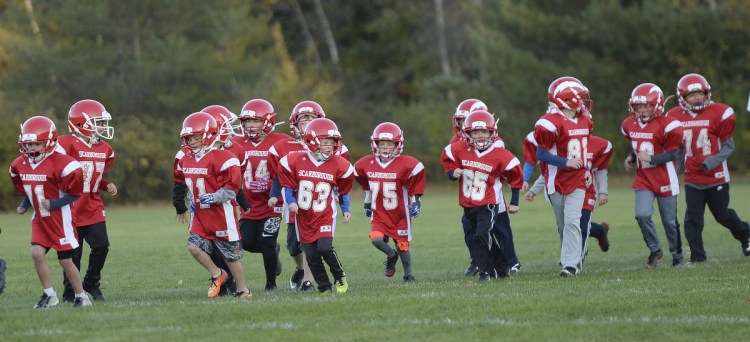AUGUSTA — A legislative panel heard public testimony Wednesday on a bill to create a commission to study and recommend a minimum age for participating in tackle football.
“I think that fairly soon we will have enough evidence that will lead us toward setting, or looking at, age limits,” said Rep. Michael Brennan, D-Portland, the bill’s sponsor. “What we’re seeing across the country is a decline in participation and parents are, in fact, setting that limit.”
The Committee on Education and Cultural Affairs heard testimony in support of forming such a commission. Representatives from the Maine Principals’ Association and the Maine Athletic Trainers Association and two physicians were among those who supported the idea. No one spoke in opposition, though some lawmakers on the committee did question whether the issue warranted legislation.
Fears over the risk of brain injuries have contributed to a sharp decline in the number of youths playing tackle football. Among children age 6 to 12, tackle football participation declined nearly 17 percent from 2010 to 2017, according to the Sports and Fitness Industry Association.
‘THE RIGHT THING TO DO’
Six states have introduced legislation calling for a tackle football age limit since 2018, though none of the bills has been passed into law.
Brennan said the growing body of evidence that links football’s repeated nonconcussive blows to chronic traumatic encephalopathy, or CTE, was the impetus for the bill.
“What we know today is different from what we knew 10 years ago, and what we know 10 years in the future might tell us that acting now was the right thing to do,” Brennan said.
CTE can only be detected through an autopsy. And even if doctors suspected someone had the disease, there is no treatment.
A 2018 study of over 200 donated brains of former college and NFL players revealed a 94 percent rate of CTE. Many living former football players report struggling with dementia, depression and degenerative diseases like Alzheimer’s and amyotrophic lateral sclerosis, known as ALS or Lou Gehrig’s disease.
A Boston University study found playing tackle football before the age of 12 is linked to a threefold risk of depression in adults.
“The micro-concussions are things people talk about more now,” said Rep. Patricia Hymanson, D-York, a retired neurologist. “The brain is knocked just a little bit and the child has no idea it’s been knocked, but over time it accumulates.”
Hymanson and Dr. Bill Heinz, an orthopedic surgeon and sports medicine physician from Portland, made clear that any group will struggle to find an answer for the proper age to start playing tackle football.
“Some neurologists will say the proper age to play football is never,” Hymanson said.
Heinz is the former chair of the Sports Medicine Advisory Committee for the National Federation of State High School Associations.
“I’m here supporting the bill from the standpoint that I think it’s important that we have a group looking at this, but I’m not necessarily in favor of legislation,” Heinz said. “We don’t have a good answer for this. We really don’t know when it’s safe for these kids to participate in contact sports.”
Heinz said the best thing a commission can do is to educate, “especially those youth coaches” who are not equipped with proper training to deal with head injuries.
SHIFT TO FLAG FOOTBALL
Ten Maine high schools will shift their tackle programs to a new eight-man football league in 2019 because they no longer have enough players to support 11-man football. Portland and Scarborough have had significant growth in their flag football programs while numbers are declining for tackle football.
In January, Maine’s chapter of the National Football Foundation – a group of prominent coaches including Colby College’s Jack Cosgrove – went on record in support of playing flag football until players reach adolescence.
“The head injuries have certainly become the focal point of youth football and football in general,” said Mike Burnham, the assistant executive director of the MPA. “Putting pads on kids who are 8 and 9 years old, are we truly teaching them tackle football or can the same skills be developed using the flags up until a certain age?”
Several speakers said that if a tackle football commission is formed, it must include a diverse group of stakeholders, including medical personnel, coaches and youth league representatives.
Burnham said the MPA would welcome being part of the commission but emphasized its oversight covers high school football.
“If we’re looking at youth programs, by and large, those programs are run through a local (recreation) program,” Burnham said.
“I think the best way to attack the issue is education. And the more education we can do the better,” said John Ryan, a certified athletic trainer and the president of the Maine Athletic Trainers Association.
Ryan emphasized to the education committee that athletic trainers are highly qualified to recognize concussion symptoms. But the presence of an AT at middle school-age football is unusual and having one at a youth-level game “rarely if ever happens.”
The education committee will hold a work session on the bill, L.D. 711, probably next week. Brennan expects the tackle football commission to be approved. If so, the commission would complete its study and submit a report in time for submission to the next legislative session.
Steve Craig can be contacted at 791-6413 or:
Send questions/comments to the editors.



